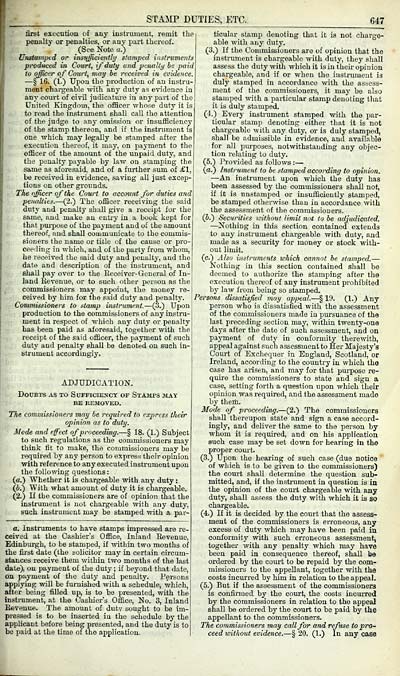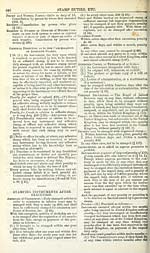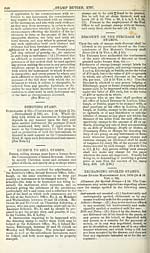Download files
Complete book:
Individual page:
Thumbnail gallery: Grid view | List view

STAMP DUTIES, ETC.
647
i^'
first execution of any instrument, remit the
penalty or penalties, or any part tbereof.
(See Note «.)
Unstamped or insufficientli/ stamped instruments
produced in Court, if duty and penaltj be paid
to officer of Court, may he received in evidence.
— § 16. (1.) Upon the production of an instru-
ment chargeable with anj^ duty as evidence in
any court of civil judicatui'e in aDj' part of the
United Kingdom, the officer whose duty it is
to read the instrument shall call the attention
of the judge to any omission or insufficiency
of the stamp thereon, and if the instrument is
one which may legally be stamped after the
execution thereof, it may, on payment to the
officer of the amount of the unpaid duty, and
the penalty payable by law on stamping the
same as aforesaid, and of a further sum of £1,
be received in evidence, saving all just excep-
tions on other grounds.
The officer of the Court to account for duties and
penalties. — (2.) The officer receiviug the said
duty and penalty shall give a receipt for the
same, and make an entry in a book kept for '
that purpose of the payment and of the amount
thereof, and shall communicate to the commis-
sioners the name or title of the cause or pro-
ceeding in which, and of the party from whom,
he received the said duty and penalty, and the
date and description of the instrument, and
sliall pay over to the Receiver- General of In-
land Revenue, or to such other person as the
commissioners may appoint, the money re
ceived by him for the said duty and penalty.
Commissioners to stamp instrument. — (3.) Upon
production to the commissioners of any instru-
ment in respect of which any duty or penalty
has been paid as aforesaid, together with the
receipt of the said officer, the payment of such
duty and penalty shall be denoted on such in-
strument accordingly.
ADJUDICATION.
Doubts ^\5 to Sufficiency of Stamps siay
be removed.
The commissioners may be required to express their
opinion as to duty.
Mode and effect of proceeding. — § 18. (1.) Subject
to such regulations as the commissioners may
think fit to make, the commissioners may be
required by any person to express their opinion
with reference to any executed instrument upon
the following questions :
(a.) Whether it is chargeable with any duty :
(6.) With what amount of duty it is chargeable.
(2.) If the commissioners are of opinion that the
instrument is not chargeable with any duty,
such instrument may be stamped with a par-
a. Instruments to have stamps impressed are re-
ceived at the Cashier's Office, Inland Revenue,
Edinburgh, to be stamped, if within two months of
the first date (the solicitor may in certain circum-
stances receive them within two months of the last
date), on payment of the duty ; if beyond that date,
on payment of the duty and penalty. Persons
applying will be furnished with a schedule, which,
after being filled up, is to be presented, with the
instrument, at the Cashier's Office, No. 3, Inland
Revenue. The amount of dutv sought to be im-
pressed is to be inserted in the schedule by the
applicant before being presented, and the duty is to
be paid at the time of the application.
ticular stamp denoting that it is not charge-
able with any duty.
(3.) If the Commissioners are of opinion that the
instrument is chargeable with duty, they shall
assess the duty with which it isin their opinion
chargeable, and if or when the instrument is
duly stamped in accordance with the assess-
ment of the commissioners, it may be also
stamped with a particular stamp denoting that
it is duly stamped.
(-1.) Every instrument stamped with the par-
ticular stamp denoting- either that it is not
chargeable with any duty, or is duly stamped,
shall be admissible in evidence, and available
for all purposes, notwithstanding any objec-
tion relating to duty.
(5.) Provided as follows : —
(a.) Instrument to be stampied according to opinion.
— An instrument upon which the duty has
been assessed by the commissioners shall not,
if it is unstamped or insufficiently stamped,
be stamped otherwise than in accordance with
the assessment of the commissioners.
(6.) Securities without limit nut to be adjudicated.
— Nothing in this section contained extends
to any instrument chargeable with duty, and
made as a security for money or stock with-
out limit,
(c.) Also instruments ivhich ca?inot be stamped. —
Nothing in this section contained shall be
deemed to authorize the stamping after the
execution thereof of any instrument prohibited
bj' law from being so stamped.
Persons dissatisfied may appeal. — § 19. (1.) Any
person who is dissatisfied with the assessment
of the commissioners made in pursuance of the
last preceding section may, within twenty-one
days after the date of such assessment, and on
paj'ment of duty in conformity therewith,
appeal against such assessment to Her Majesty's
Com-t of Exchequer in England, Scotland, or
Ireland, according to the country in which the
case has arisen, and may for that purpose re-
quire the commissioners to state and sign a
case, setting forth a question upon which their
opinion was required, and the assessment made
by theili.
Mode of proceeding. — (2.) The commissioners
shall thereupon state and sign a case accord-
ingly, and deliver the same to the person by
whom it is reqixired, and on his application
such case may be set down for hearing in the
proper court.
(3.) Upon the hearing of such case (due notice
of which is to be given to the commissioners)
the court shall determine the question sub-
mitted, and, if the instrument in question is in
the opinion of the court chargeable with any
duty, shall assess the duty with which it is so
chargeable.
(4.) If it is decided by the court that the assess-
ment of the commissioners is erroneous, any
excess of duty which may have been paid in
conformity with such erroneous assessment,
together with any penalty which may have
been paid in consequence thereof, shall be
ordered by the court to be repaid by the com-
missioners to the appellant, together with the
costs incurred by him in relation to the appeal.
(5.) But if the assessment of the commissioners
is confirmed by the court, the costs incurred
by the commissioners in relation to the appeal
shall be ordered bj' the court to be paid by the
appellant to the commissioners.
The commissioners may call for and refuse to pro-
ceed ivithout evidence. — § 20. (1.) In any case
647
i^'
first execution of any instrument, remit the
penalty or penalties, or any part tbereof.
(See Note «.)
Unstamped or insufficientli/ stamped instruments
produced in Court, if duty and penaltj be paid
to officer of Court, may he received in evidence.
— § 16. (1.) Upon the production of an instru-
ment chargeable with anj^ duty as evidence in
any court of civil judicatui'e in aDj' part of the
United Kingdom, the officer whose duty it is
to read the instrument shall call the attention
of the judge to any omission or insufficiency
of the stamp thereon, and if the instrument is
one which may legally be stamped after the
execution thereof, it may, on payment to the
officer of the amount of the unpaid duty, and
the penalty payable by law on stamping the
same as aforesaid, and of a further sum of £1,
be received in evidence, saving all just excep-
tions on other grounds.
The officer of the Court to account for duties and
penalties. — (2.) The officer receiviug the said
duty and penalty shall give a receipt for the
same, and make an entry in a book kept for '
that purpose of the payment and of the amount
thereof, and shall communicate to the commis-
sioners the name or title of the cause or pro-
ceeding in which, and of the party from whom,
he received the said duty and penalty, and the
date and description of the instrument, and
sliall pay over to the Receiver- General of In-
land Revenue, or to such other person as the
commissioners may appoint, the money re
ceived by him for the said duty and penalty.
Commissioners to stamp instrument. — (3.) Upon
production to the commissioners of any instru-
ment in respect of which any duty or penalty
has been paid as aforesaid, together with the
receipt of the said officer, the payment of such
duty and penalty shall be denoted on such in-
strument accordingly.
ADJUDICATION.
Doubts ^\5 to Sufficiency of Stamps siay
be removed.
The commissioners may be required to express their
opinion as to duty.
Mode and effect of proceeding. — § 18. (1.) Subject
to such regulations as the commissioners may
think fit to make, the commissioners may be
required by any person to express their opinion
with reference to any executed instrument upon
the following questions :
(a.) Whether it is chargeable with any duty :
(6.) With what amount of duty it is chargeable.
(2.) If the commissioners are of opinion that the
instrument is not chargeable with any duty,
such instrument may be stamped with a par-
a. Instruments to have stamps impressed are re-
ceived at the Cashier's Office, Inland Revenue,
Edinburgh, to be stamped, if within two months of
the first date (the solicitor may in certain circum-
stances receive them within two months of the last
date), on payment of the duty ; if beyond that date,
on payment of the duty and penalty. Persons
applying will be furnished with a schedule, which,
after being filled up, is to be presented, with the
instrument, at the Cashier's Office, No. 3, Inland
Revenue. The amount of dutv sought to be im-
pressed is to be inserted in the schedule by the
applicant before being presented, and the duty is to
be paid at the time of the application.
ticular stamp denoting that it is not charge-
able with any duty.
(3.) If the Commissioners are of opinion that the
instrument is chargeable with duty, they shall
assess the duty with which it isin their opinion
chargeable, and if or when the instrument is
duly stamped in accordance with the assess-
ment of the commissioners, it may be also
stamped with a particular stamp denoting that
it is duly stamped.
(-1.) Every instrument stamped with the par-
ticular stamp denoting- either that it is not
chargeable with any duty, or is duly stamped,
shall be admissible in evidence, and available
for all purposes, notwithstanding any objec-
tion relating to duty.
(5.) Provided as follows : —
(a.) Instrument to be stampied according to opinion.
— An instrument upon which the duty has
been assessed by the commissioners shall not,
if it is unstamped or insufficiently stamped,
be stamped otherwise than in accordance with
the assessment of the commissioners.
(6.) Securities without limit nut to be adjudicated.
— Nothing in this section contained extends
to any instrument chargeable with duty, and
made as a security for money or stock with-
out limit,
(c.) Also instruments ivhich ca?inot be stamped. —
Nothing in this section contained shall be
deemed to authorize the stamping after the
execution thereof of any instrument prohibited
bj' law from being so stamped.
Persons dissatisfied may appeal. — § 19. (1.) Any
person who is dissatisfied with the assessment
of the commissioners made in pursuance of the
last preceding section may, within twenty-one
days after the date of such assessment, and on
paj'ment of duty in conformity therewith,
appeal against such assessment to Her Majesty's
Com-t of Exchequer in England, Scotland, or
Ireland, according to the country in which the
case has arisen, and may for that purpose re-
quire the commissioners to state and sign a
case, setting forth a question upon which their
opinion was required, and the assessment made
by theili.
Mode of proceeding. — (2.) The commissioners
shall thereupon state and sign a case accord-
ingly, and deliver the same to the person by
whom it is reqixired, and on his application
such case may be set down for hearing in the
proper court.
(3.) Upon the hearing of such case (due notice
of which is to be given to the commissioners)
the court shall determine the question sub-
mitted, and, if the instrument in question is in
the opinion of the court chargeable with any
duty, shall assess the duty with which it is so
chargeable.
(4.) If it is decided by the court that the assess-
ment of the commissioners is erroneous, any
excess of duty which may have been paid in
conformity with such erroneous assessment,
together with any penalty which may have
been paid in consequence thereof, shall be
ordered by the court to be repaid by the com-
missioners to the appellant, together with the
costs incurred by him in relation to the appeal.
(5.) But if the assessment of the commissioners
is confirmed by the court, the costs incurred
by the commissioners in relation to the appeal
shall be ordered bj' the court to be paid by the
appellant to the commissioners.
The commissioners may call for and refuse to pro-
ceed ivithout evidence. — § 20. (1.) In any case
Set display mode to: Large image | Transcription
Images and transcriptions on this page, including medium image downloads, may be used under the Creative Commons Attribution 4.0 International Licence unless otherwise stated. ![]()
| Scottish Post Office Directories > Towns > Edinburgh > Post Office Edinburgh and Leith directory > 1871-1872 > (685) |
|---|
| Permanent URL | https://digital.nls.uk/83190720 |
|---|
| Description | Directories of individual Scottish towns and their suburbs. |
|---|
| Description | Around 700 Scottish directories published annually by the Post Office or private publishers between 1773 and 1911. Most of Scotland covered, with a focus on Edinburgh, Glasgow, Dundee and Aberdeen. Most volumes include a general directory (A-Z by surname), street directory (A-Z by street) and trade directory (A-Z by trade). |
|---|


